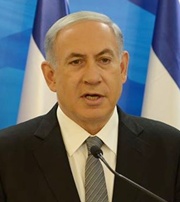Israel must end Palestine occupation, says top Obama aide
24 Mar 2015
 The United States expects the next Israeli government to end nearly 50 years of occupation and clear the way for a Palestinian state, White House chief of staff Denis McDonough told Jewish Americans on Monday.
The United States expects the next Israeli government to end nearly 50 years of occupation and clear the way for a Palestinian state, White House chief of staff Denis McDonough told Jewish Americans on Monday.
It was a strong statement for the US, long perceived as being pro-Israel due to its influential Jewish population.
McDonough also vowed that the US would safeguard Israel, but criticised Israeli Prime Minister Benjamin Netanyahu's abandonment of a Palestinian state in the run-up to a re-election on March 17.
Netanyahu is working to form Israel's next coalition government. Israeli President Reuven Rivlin announced on Monday that Netanyahu had secured the backing of 67 of the 120 MPs elected last week, and officially designated him to form the next government
Netanyahu's Likud received the backing of the far-right, pro-settler Jewish Home Party, the ultra-nationalist Yisrael Beitenu party and the centrist Kulanu, along with ultra-Orthodox parties.
Netanyahu has 28 days to form a coalition. He can ask Rivlin for a 14-day extension, but his aides said he aims to form a government faster than that.
One of US President Barack Obama's closest White House advisers, McDonough said a separate Palestinian state is the best guarantee of Israel's long-term security. "An occupation that has lasted for almost 50 years must end, and the Palestinian people must have the right to live in, and govern themselves in, their own sovereign state," he said.
Palestinians seek a state in the Gaza Strip, the West Bank and East Jerusalem, lands Israel captured in the June 1967 Arab-Israeli war.
"In the end, we know what a peace agreement should look like. The borders of Israel and an independent Palestine should be based on the [June 4] 1967 lines with mutually agreed swaps," McDonough said.
Since his re-election, Mr Netanyahu has tried to row back on his election eve remarks dismissing a two-state solution, long a cornerstone of US peacemaking efforts. But McDonough said Washington remained troubled. "We cannot simply pretend that these comments were never made," he said.
Separately, US State Department spokeswoman Marie Harf told reporters the administration was unsure where the Israeli leader stood. Netanyahu has said "diametrically opposing things, so which is his actual policy?" Harf told reporters, in another indication of the increasing rift between Israel and the Obama administration. "I think we just don't know what to believe at this point."



















